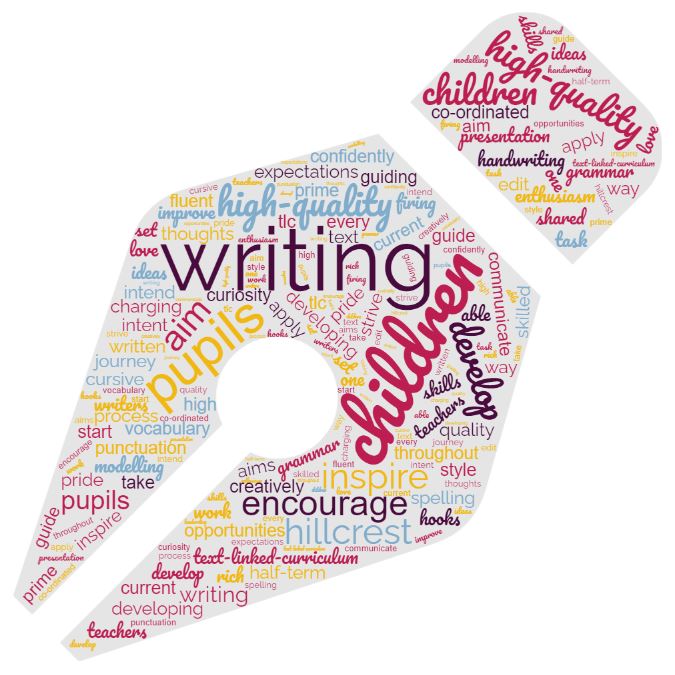English: Writing

Writing for a purpose is a fundamental part of our Text Linked Curriculum. Pupils delve into their focus text and use this as a stimulus for their own writing across a wide range of genres.
Hillcrest's 5 Principles of Writing
At Hillcrest, each subject team has created 5 key principles, outlining what makes up quality teaching in each subject:
|
|
|
|
|
|
|
|
|
Click on the INTENT, IMPLEMENTATION and IMPACT bars below to discover why and how we teach Writing.
INTENT Statement for Writing
At Hillcrest, it is one of our prime aims for children to develop a love of writing throughout their journey with us. We aim for children to be able to communicate their thoughts and ideas creatively, developing a rich vocabulary from our quality Text-Linked-Curriculum (TLC). We intend to inspire our pupils with ‘hooks’ at the start of each half-term, firing their curiosity and charging their enthusiasm for their current high-quality text. We aim to inspire our pupils through high-quality shared writing opportunities where skilled teachers guide pupils through the writing process, modelling and guiding as they go. We strive for our writers to confidently apply their grammar, punctuation and spelling skills in every written task in a co-ordinated way. At Hillcrest, we set high expectations for presentation and encourage children to develop a fluent, cursive handwriting style. We encourage children to edit and improve their writing and to take pride in their work.
IMPLEMENTATION Statement for Writing
-
Writing is creatively and purposefully inspired by our TLC texts and ‘hooks’.
-
Opportunities for extended writing is woven throughout the curriculum with children completing at least 2 pieces in their “Author” books every half-term.
-
Writing opportunities enable the pupils to confidently write for different purposes and audiences, with teachers planning for real-life opportunities to write.
-
Vocabulary is promoted through displays in class, all curriculum areas, enhancing and encouraging a wider use of vocabulary.
-
Children are encouraged to use knowledge organisers, vocabulary mats, dictionaries and thesauruses to up level vocabulary.
-
Spelling rules are taught at the beginning of each week and referred to throughout the rest of the week so that pupils can confidently apply them in their own writing.
-
Children learn spellings at home each week and these are tested in school. Children who need additional support with spelling receive interventions to address their gaps.
-
Spelling, punctuation and grammar is taught directly and in context of our TLC. Pupils are expected to apply their spelling, punctuation and grammar knowledge in all subjects.
-
Pupils are taught to understand grammatical terminology in English, using it accurately and appropriately when discussing their writing and reading.
-
We have high expectations of children’s handwriting, which is taught and practised weekly.
-
Teachers use pieces of extended writing in Author books as summative assessment for that particular sequence and as formative assessment (ongoing) throughout the year.
Accordion Title
At Hillcrest, children will develop a love of writing and make good progress from their starting points. They will write in a co-ordinated and creative way, bringing together all aspects of their Writing learning into cohesive pieces that inspire the reader. They will enjoy writing across a range of genres and have a good knowledge of how to adapt their writing based on the context purpose and audience. They will be able to write clearly and accurately, confidently using their spelling, grammar and punctuation knowledge effectively. They will acquire a wide vocabulary and be creative with their vocabulary choices within their writing.







